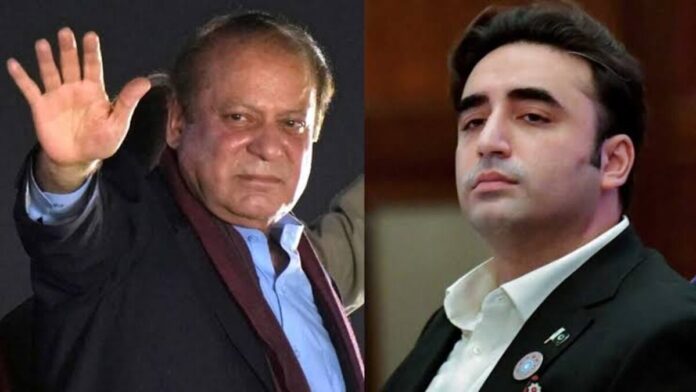Pakistan, a nuclear-armed nation of 241 million people, is facing several challenges, thus on Thursday, February 8, it will hold its 12th national general elections to choose a new administration. The News stated that Nawaz Sharif’s Pakistan Muslim League Nawaz is expected to become the single largest party, with Bilawal Bhutto Zardari’s Pakistan Peoples Party trailing well behind, then Imran Khan’s Pakistan Tehreek-e-Insaf and other parties.
Nawaz Sharif is predicted to become the front-runner for the prime minister position while Imran Khan, the previous prime minister, is still incarcerated. The candidates of Imran Khan’s Pakistan Tehreek-e-Insaf, or PTI, are running separately in the elections following the Supreme Court’s confirmation of the election commission’s decision to strip the PTI of its famous cricket bat.
In Thursday’s election, 74-year-old Nawaz Sharif will be vying for the prime ministership for a record-tying fourth time. The PPP of Bilawal Bhutto-Zardari, who has been named the party’s prime minister face, is also competing.
But with the weakening economy and deteriorating security, whoever wins the elections on February 8 will face a difficult task. With the help of a $3 billion short-term loan from the International Monetary Fund (IMF) last year, Pakistan just missed default. According to economists, the incoming government will require an immediate, new IMF programme with stricter requirements.
Pakistan’s battle against terrorism, which has lasted for more than 20 years, is also being undone as a result of the insurgents’ resurgence since the Afghan Taliban took power in 2021. The new government will find it tougher to deal with the militancy of the banned Tehreek-i-Taliban Pakistan and Baloch nationalists.
Fresh tensions have emerged on India’s eastern border after Islamabad claimed that India was conducting an assassination operation within Pakistan, a claim that New India has categorically denied. India dismissed Pakistan’s claim of proof linking Indian operatives to the deliberate killing of two Pakistani residents on its territory on January 25, calling it “false and malicious anti-India propaganda.” India vehemently disagreed with Pakistan’s claim.
By May, India will hold its Lok Sabha elections, and a big mandate for a return to power for the Narendra Modi-led government might make things more difficult for Pakistan’s incoming administration.
Due to claims of election tampering in favour of the Pakistan Army’s selected candidates, the level of the army’s influence over the nation’s politics is now well acknowledged. In the 2018 elections, the Pakistan Army effectively “selected” Imran Khan, a cricket icon-turned-politician, to replace Nawaz Sharif as the leader of the PML(N). Imran Khan assumed the role of prime minister after Nawaz Sharif’s conviction, although Nawaz Sharif was subsequently permitted to leave the country, and only returned in October 2023, when suddenly all the cases against him vanished into thin air.
Experts have indicated that this time, Nawaz Sharif has the blessings of the army.
“What is scheduled to happen on February 8 seems less like an election and more like a selection because Pakistan’s Army has shown us in the past few days what result they are desiring in the upcoming elections. They want Nawaz Sharif to be selected,” news agency quoted former high commissioner of India to Islamabad Ajay Bisaria as saying.
Asim Munir, the chief general of the Pakistan Army, will solidify his hold on the nation’s political leadership in the 2024 election. The elections are important because, for the first time in Pakistani history, the army’s hegemony was challenged by the popularity of a civilian leader, Imran Khan.
Ahead of the polls, New Delhi would be keenly observing everything going on in its neighbouring country, with special attention to the Pakistan Army’s role in choosing the country’s next prime minister. India has often expressed concerns about Pakistan’s continued backing for terrorism, which has forced the government of Narendra Modi to take a more stringent approach to issues pertaining to national security.
“India has dealt with Pakistan’s generals who took charge of the country before. But General Munir’s quest for greater control may not be the movie we have seen before. To be sure, the dominant assumption in Delhi is that nothing ever changes in Pakistan. And that Pakistan’s generals will muddle along as they retain hold over Pakistan. Munir, however, is taking control amid the growing prospect that the old order in Pakistan is becoming unsustainable,” The news agency quoted geopolitical expert C Raja Mohan as saying.
Nawaz Sharif has acknowledged the advancements made by his neighbour, India, and shown a readiness to interact with the country in recent remarks. But according to his party’s manifesto, peace with India will only be pursued if New Delhi backtracks on its decision to remove Article 370, which gave Jammu and Kashmir unique status.
According to Moneycontrol, one notable accomplishment of Prime Minister Narendra Modi’s foreign policy has been the exclusion of Pakistan from India’s diplomatic agenda—a tactic that has worked so far. This strategy enables India to uphold the old mantra of former Prime Minister Atal Bihari Vajpayee, “We can change our friends but not our neighbours,” while also being obliging to changes in power in Islamabad.
According to the interior ministry, Pakistan briefly shut down mobile phone service on Thursday in order to bolster security as the nation’s national election got underway.
The government’s decision was made the day after Imran Khan urged his followers to remain outside polling places until the results were released, and in the midst of an increase in terrorist attacks in the lead-up to the election.




